I think that I shall never see
A poem lovely as a tree.
A tree whose hungry mouth is prest
Against the earth’s sweet flowing breast;
A tree that looks at God all day,
And lifts her leafy arms to pray;
A tree that may in summer wear
A nest of robins in her hair;
Upon whose bosom snow has lain;
Who intimately lives with rain.
Poems are made by fools like me,
But only God can make a tree.
I think that I shall never see
A poem lovely as a tree.
A tree whose hungry mouth is prest
Against the earth’s sweet flowing breast;
A tree that looks at God all day,
And lifts her leafy arms to pray;
A tree that may in summer wear
A nest of robins in her hair;
Upon whose bosom snow has lain;
Who intimately lives with rain.
Poems are made by fools like me,
But only God can make a tree.
– Joyce Kilmer
In 1913, two years after the Baker & Taylor Company published his first book, A Summer of Love, Joyce Kilmer wrote a simple, fourteen-line poem that would become his most famous work. He titled it, Trees. It first appeared in Poetry magazine.
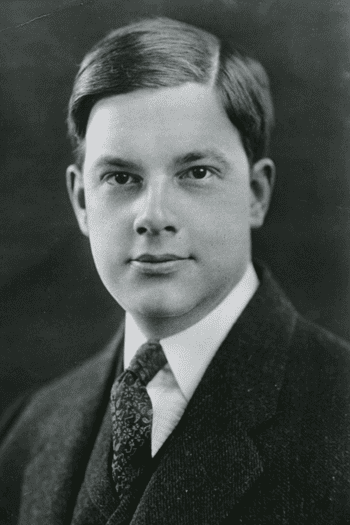
Alfred Joyce Kilmer was born in New Brunswick, New Jersey in December 1886. His father, Frederick was a Connecticut born (1851) chemist; his mother, Annie was born (1852) in New York. The couple had four children, but only Joyce lived past infancy.
There is a perfectly reasonable explanation for his given name. He was named Alfred Joyce Kilmer after two priests at Christ Church in New Brunswick: Alfred R. Taylor, the curate; and the Rev. Dr. Elisha Brooks Joyce, the rector. Kilmer chose to be called Joyce; he liked the way it “sounded.”
Kilmer attended Rutgers Preparatory School and graduated in 1904, after which he attended Rutgers College for two years, then transferred to Columbia University, where he completed his bachelor’s degree in journalism in 1908. He married Aline Murry later that year. Aline was a Virginia born (1888) writer who specialized in short stories for children. The couple had one son, Kenton, who was born in 1909. Mrs. Kilmer died in New Jersey in 1941. Their son moved to Vienna, Virginia, after his marriage to Frances Frieseke in 1937 in the tiny little village of Mesnil-sur-Blangy, France. Kenton died in February 1995. He was 85.
After college, Kilmer’s first job was teaching high school Latin in Morristown, New Jersey. Teaching was something he loved, but he also wrote features for The Literary Digest and the New York Times Magazine.
Kilmer was a very lineal person; he liked doing one thing at a time and doing it very well, although he frequently worked for very different literary outlets at the same time. From 1909 to 1912, he worked as a definitions writer for Funk and Wagnalls, publishers of Funk and Wagnalls Standard Dictionary, and at the same time prepared a second collection of poems that Doubleday published in 1914.
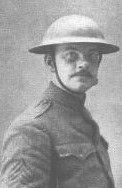
Kilmer completed his last poetry collection, Main Street and Other Poems in 1917, just a few months before he enlisted in the U.S. Army to serve in World War One. Sergeant Kilmer was killed in the thick of the Marne River battle while fighting with the 165th Infantry in Nesles, France (about 45 miles west of Reims.) His death came from a German sniper’s gunshot on July 30, 1918. He was 31.
Kilmer was buried with his fallen comrades in the American Cemetery in Fere-en-Tardenois, at Picardie, France, however there is a cenotaph for him in the family plot at Elmwood Cemetery, in New Brunswick, New Jersey.
Photographs and postcards of Kilmer are few. Postcard History had no luck finding a portrait postcard of Kilmer, but there are several views of the memorial to the poet at Camp Kilmer, New Jersey. The photo of Kilmer with this article is his 1908 Columbia University graduation photo. The 1918 photo of Sergeant Kilmer is one of only two known photographs from that time in his life.
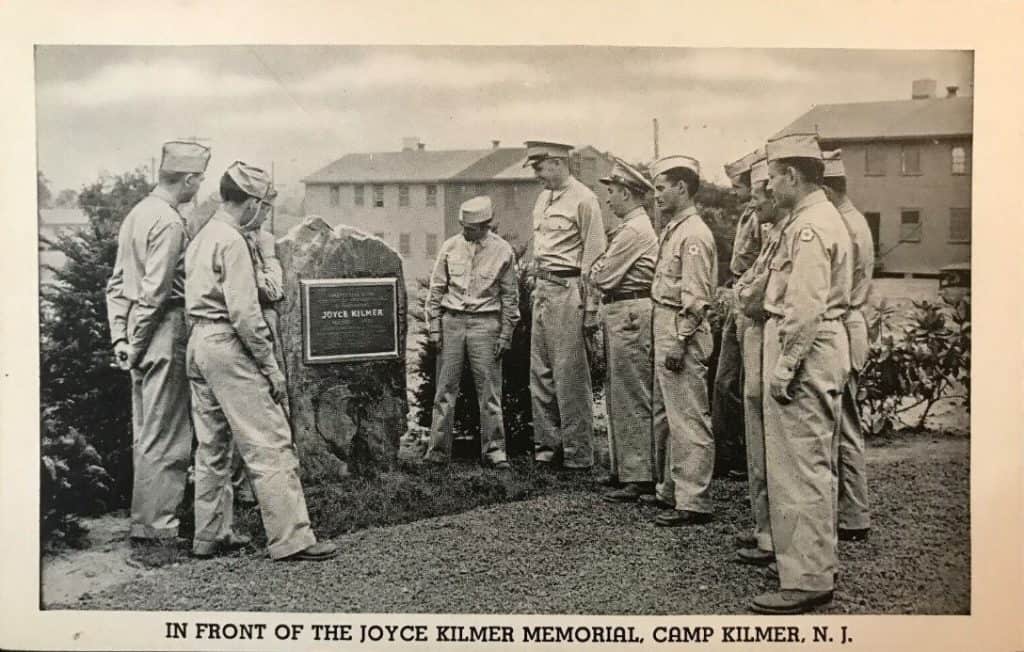
[Editor’s note: Since postcards of the poet are scarce, Postcard History will go out on a limb – pun intended – and present an array of the six cards that Tuck & Sons published the same year that Kilmer graduated from Columbia University. There is a fair chance that Kilmer would have liked these cards. All things considered, every possibility exists that during his time in Europe, he may well have sent Tuck postcards home to his wife and son.]
Raphael Tuck & Sons
Presents
SPRING BLOSSOMS
a six postcard set in the “Oilette” Series
No. 9550
Images by Harry Payne

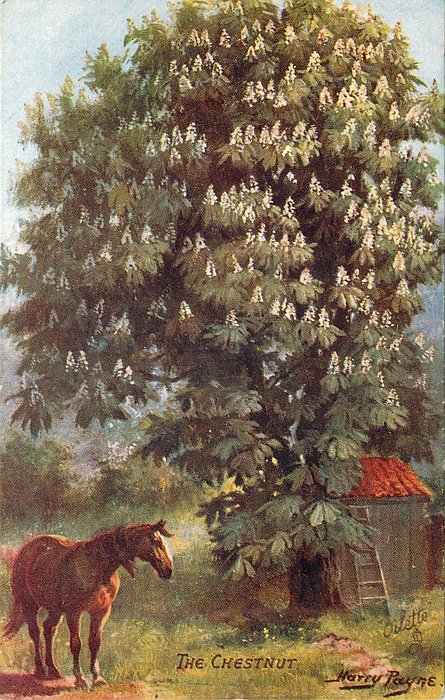

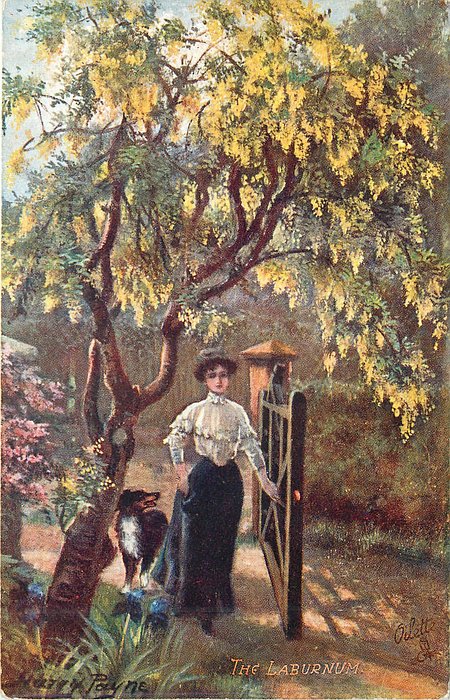
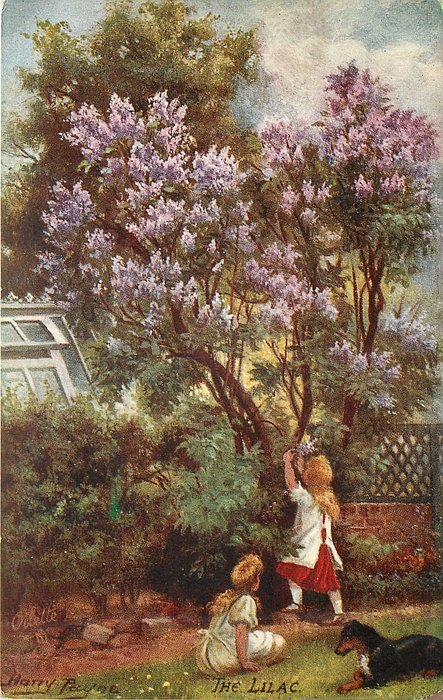
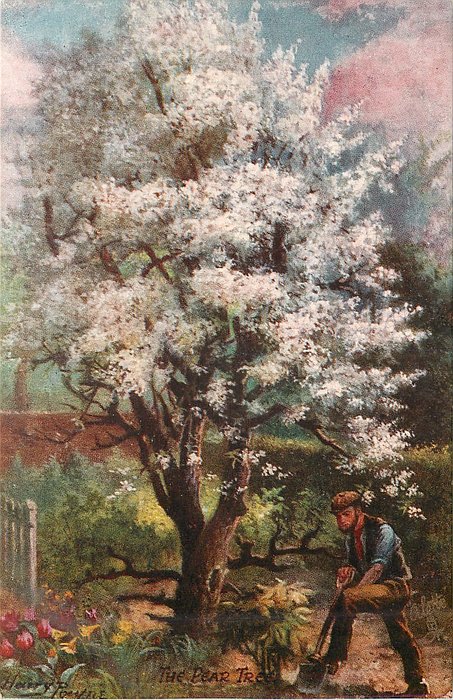
Very interesting article about Joyce Kilmer and his short life. A rest stop on the New Jersey Turnpike was named in his honor.
Did they plant any trees or is it as bereft of shade as are the rest stops here in New York?
I remember the following takeoff on Kilmer’s signature poem:
“I think that I shall never see
A billboard lovely as a tree.
Unless, of course, the billboards fall,
I’ll never see a tree at all!”
Living not too far from New Brunswick from 1949 to 1960, I often wondered why they named the turnpike New Brunswick exit for Joyce Kilmer, who until now, I assumed was a female. Another thing I did not know at the time was that my best friend’s father, Richard Sellers, “saved” New Brunswick’s future by locating the planned new Johnson & Johnson corporate headquarters there, rather than moving it to another NJ area. He was the Chairman of the Board at the time.
Ellie,
Thank you, you made my day.
Michael Langenstein
https://www.youtube.com/watch?v=m3udNed7meg
Excellent article.
I love that poem is my favorite poem my best friend got me to read this poem for her all the time and to the writer Mr.Joyce Kilmer
This poem has brought me immense joy and comfort. It has brought many elderly friends of mine joy as they have challenged themselves to memorize the words and pridefully recite it!